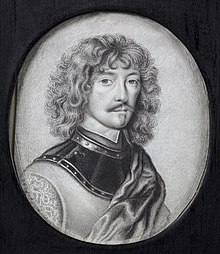William Murray, 1st Earl of Dysart
| William Murray | |
|---|---|

William Murray, Earl Dysart, by David Paton
|
|
| Born | ca. 1600 Dysart, Fife, Scotland |
| Died | December 1655 Edinburgh |
| Nationality | Scottish |
| Known for | Whipping boy to Charles I of England |
| Title | Earl of Dysart |
| Spouse(s) | Catharine Bruce |
| Children | Elizabeth, Anne, Catherine, Margaret |
| Relatives | Thomas Murray, uncle, tutor to Charles, Prince of Wales |
William Murray, first Earl of Dysart (1600? – December, 1655), was the childhood whipping boy of Charles I of England and later, an adviser to the king.
Born about 1600, Murray was son of William Murray (1561?–1616), minister of Dysart, Fifeshire, by his wife Margaret. The father was a younger brother of Murray of Woodend, and was descended from a younger son of the family of Dollarie, which was a branch of the house of Tullibardine. William's uncle, Thomas Murray, took his nephew to court when a boy, and educated him along with Prince Charles. The latter and Murray were about the same age, and became very intimate.
In 1626, Charles appointed him one of the Gentlemen of the Bedchamber, and retained him in his service ever afterwards. Charles granted Murray the lease of Ham House, close to the palace at Richmond, London and conveniently situated for access to the palaces in London, Hampton Court and Windsor and it was here that Murray established his family.
Murray had great influence with Charles, both as an adviser and in procuring favours for others. He was closely related to some of the leading covenanters — his uncle was the Rev. Robert Murray, minister of Methven from 1615 to 1648, whose daughter married George Gillespie — and Murray was a medium of private negotiations between them and the king. Montrose affirmed that Murray had sent to the Scots at Newcastle in October 1640 copies of private letters which he had written to the king, then at York. He accompanied Charles to Scotland in 1641, and having got access to Montrose (who was then a prisoner in Edinburgh Castle, by order of the covenanters) he carried communications from one to the other. After encouraging the impeachment of Hamilton and Argyll, it is said that Murray informed them of their danger, and hence their flight. At this time, Murray stood high in favour with the Scottish church, for soon after the king's return to England the commission of assembly besought Charles to "lay on him the agenting of the affairs of the church about his majesty." It was generally believed that Murray told his friend, Lord Digby, of the king's intention to arrest the five members of the House of Commons, and that Digby betrayed the secret.
...
Wikipedia
